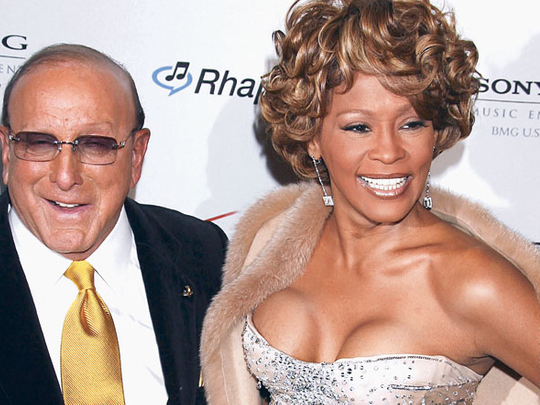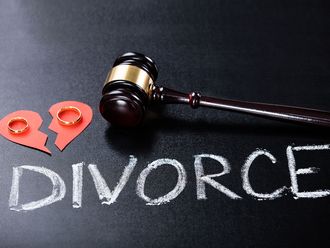
He’s the star maker and record company executive who’s had a hand in the careers of artists from Bruce Springsteen and Aerosmith to Janis Joplin and Alicia Keys. But one of his most famous coups was signing the young Whitney Houston to his Arista Records label in 1983. Davis describes the day he first heard The Voice.
Q: Let’s begin at the very beginning. Describe the first time you heard Whitney sing.
A: The first time I heard Whitney sing was at a club called Sweetwater’s. I remember it being on Amsterdam Avenue at about 68th St. She was really doing backup signing for her mother, Cissy Houston, who was the featured performer at Sweetwater’s. I had been told about her by Jerry Griffith — an A&R man who worked for me at Arista Records.
Instead of having her audition in a studio, I was seeing her before an audience. She did backup singing and you could see she was a beautiful young girl. But then she stepped out and she did two solo numbers, one of which was the song The Greatest Love of All. That was a song that I had commissioned about 10 years earlier for a movie about the life of Muhammed Ali called The Greatest (Michael Masser and Linda Creed co-wrote it) and I was very familiar with it because George Benson had a top ten record of that song. But It was sung with such fervour... with such natural vocal gifts, with such passion, that I was stunned.
I really knew right then and there that this was a special talent and I was blown away by her.
I remember going to the lobby of the club and calling [co-writer] Michael Masser at that very same time and saying, “You’ve gotta fly in. I’ve just seen this new artist. I have no right to sign her yet and there has to be some other company interest, but you have to fly in and see her the second night. You’ve got to hear what she does with your song.” And Michael did fly in and we both saw her the second night. It was very stunning, very palpable. As I talk about it, I can relive the experience for the very first time as the so-called audition. There was no hesitation.
Q: What was the influence of Whitney’s mother Cissy and aunt Dionne Warwick and having people like Aretha Franklin in her world growing up?
A: Whitney was very unique unto her self. Obviously, over the years and hearing her given influences, I know her childhood was filled with music. She would visit recording studios and be at the sessions. She went to church every week with her mother who was a Baptist minister. Music was part of her life whether it was secular or whether it was church music. She came by music very naturally, very much a part of her being. But I didn’t look for influences.
She was very different from Aretha and from Cissy and from Dionne, but what I do remember are two things: I do remember that from the discussions, and not knowing what the competition was,I knew that I had connected with her. I knew that I had connected with Cissy. Whitney being so young, she was going to do what her mother and her father felt were right, because John was becoming a part of the business representation for Whitney, along with managers who were in the picture as well. I heard she would request a key man clause from me that meant that if I ever left the company, she would have the right to leave. So I knew that the connection was there because of the insistence of the clause which I had to absent myself from because it was awkward for me to give that right. The right was given to her to be able to leave the company, if at any time I left. Historically, I should add, several years later she gave up that right for many millions of dollars. But... we had connected.
I had been fortunate that very soon after I had formed Arista, Merv Griffin had a national TV show and he approached me and gave me the right to co-host that show with him on two separate occasions and bring my artists on, I brought on Barry Manilow and Melissa Manchester and Eric Carmen and Dionne Warwick and Aretha Franklin over that two-year period of time. I had gone through the most prominent pop and R&B singers. Rock did not go well with television. So in the Patti Smith world and the Grateful Dead world and The Kinks world they were not going to go on this pop national network show. So I [had] made a deal with Merv after the second of such specials: that if I came across an artist that I thought was very special, rather than do the whole show again I would bring that artist on. I triggered that and called him and said, I do have such an artist that I just signed, and I brought on Whitney.
I’m paraphrasing, but in my recollection I remember saying to the camera that if there were to be an artist for this generation that would combine the stunning beauty and lyric depth of a Lena Horne, mixed with the fiery gospel that was a signature trademark of Aretha Franklin... for this next generation, it would be Whitney Houston. And I remember introducing Whitney in that manner.
And I remember her coming on and singing the song Home from the Broadway show The Wiz. And then began the odyssey, then began the adventure — then began the challenge of how to get that material for this first debut album that was going to be so special. And so apart from using that clip from the Merv Griffin show of her singing Home to give writers an idea of what she was like, I decided to have a showcase for Whitney of the best writers out there and just say, “I have a special new talent.”
So I took over the Roxy Theatre on Sunset Boulevard in Los Angeles and invited all the writers I knew.
I did this for Leona Lewis a few years ago, because the key is to come up with great material and you have to keep the bar up there. It was the same for this brand new Whitney Houston album [I Look To You] that has just come out here in the year 2009. You’ve got to wait for that special material. It’s not that the artist is not ready, but you have to wait for the material to make it a special album.
So we did that showcase at the Roxy and it was there that Jermaine Jackson saw her. It’s there that Michael Masser reconnected with her and in New York Kashif had seen her. And so that was pretty much the writer production source that was utilised for this debut album.
I think four cuts were done by Michael Masser. I think three cuts were done by Jermaine Jackson as a producer and two cuts were done by Kashif as a producer. The tenth cut was produced by Narada Michael Walden and it was a song called How Will I Know. We wanted an up-tempo cut for the album, and George Merrill and Shannon Rubicam had just sent that to me — you get material when people know you’re looking. I had a previous relationship with Narada. I worked with him on a number of cuts for Aretha Franklin. And so I had a relationship with [him]. I asked Narada to produce How Will I Know.
Q: What did you think would be the biggest challenge in recording her debut?
A: There was no challenge of getting the record out of Whitney. She was a natural. Whitney was a natural resource. She had a soaring range. She had power, she had lyrical expressiveness. It was a pure natural gift. The challenge was finding the right material and making sure that in its arrangement, that in its production, which is always the challenge, that you come up with not only strong material, but also the right arrangement and production so that these are not demos for other artists who come along and cover her. That they’d be hits for Whitney Houston.
Q: What was it that she needed to show? Was it the expressive range? Was it the instrument that she had?
A: When you do an album — to this day the principles are the same for me. It’s in the selection of the material and making sure the arrangement and the production are right. It’s not saying, I want to have a note that can hold. It’s gotta follow and be integral to the song and to the arrangement and the production. That is the challenge. The artist is there, so it’s no different with Whitney’s first album than it was for this so-called comeback album of Whitney.
Q: Describe Whitney on the first day of recording.
A: The first record that she actually did I was not there. I don’t make a practice of attending sessions. I critique afterwards, but I don’t attend; that’s not my style, that I’ve developed over the years, I’m there to pick the artist at the beginning. Then I’m there for those who do not write. To go through all the material that’s submitted — in some cases hundreds and hundreds of songs — and say, that song if it could be arranged right, produced right, could be a hit record for the particular artist.
Being there at the beginning and choosing that repertoire, I’m pretty relentless to make sure it’s delivered so the artist — I don’t care who the artist is, if I found the material — would have to go back and sing it again or perhaps a slightly different arrangement of the song.
The first song that was actually done for the album we lent Whitney out to Elektra Records to do a duet with Teddy Pendergrass and it was a Michael Masser song. Michael was involved with Whitney in the making of the album because the album took over a year or two years to come up with this material, the song Hold Me came about and we sort of allowed Whitney to appear on Teddy Pendergrass’s album and they had the record of Hold Me and that was released as a single on Elektra Records and us having the right to include it on the album, which it was as the tenth cut on this album.
She did it the course of doing the Whitney Houston album, but it was the first record of hers that was released that would be a part of Whitney Houston. She was a power house and a natural from the beginning, from the time I saw her in her mother’s act to the time I introduced her on the Merv Griffin show. You went to see the show and heard what they were doing abroad and you would hear Whitney Houston sing Home and it would send shivers through you.
This was an incredible natural, natural vocalist. She became more and more familiar in the studio. Michael Masser is a perfectionist, of all of the producers he was the perfectionist and every note and every sound — he was putting her through the paces of singing, so I’m sure she learned in the making of this album, it wasn’t that she knew how to record. She would just sing. I know on the front line, he very much was there, but he and I had become very good friends by that point. He played takes for me, rough cuts for me and I’d make some comments. She was always very willing, a workaholic. She would go back and do it and it wouldn’t be a problem.
Q: Was there one song, was there one performance where you could see it click?
A: The first single came out to be You Give Good Love. In the making of the album, it was the balance that you knew would be her signature. It was really the three ballads that were done specifically for Whitney Houston the album. Saving All My Love For You, All At Once, and of course the Greatest Love of All that you could feel would be those signature pieces. If ballads would get on the radio and if she were to be given that shot of exposure, those would become signature copyrights and signature songs.
You Give Good Love sounded great too and one knew if one had to go (which so often was the case then) first to R&B and then to pop, that You Give Good Love was chosen for that reason: you certainly wanted the African-American community to adopt Whitney. Although most of these great ballads would really be considered pop songs, once she broke through with “You Give Good Love” and was embraced by the African-American community as well as the pop community, then she crosses back and forth and I just have blinders on.
I was just picking hit songs, to me what I thought were hit songs. I knew once we had the ballads and once we had the first single of You Give Good Love, that we would need something up tempo. And for that reason when I listened to How Will I Know I say said... well, this really gives us the up-tempo that we need for the album.
Q: Was that the final ingredient in getting the mix of the album right?
A: Chronologically I don’t want to misspeak or be historically inaccurate, but in my head the answer is “yes”. I felt How Will I Know completed the kind of tempos that we needed for the album.
Q: Which of her performances on the album surprised you the most?
A: I think I was most gratified about The Greatest Love of All, because I had had apprehension. Would the magic of the first song I ever saw her sing, Greatest Love of All, come out as a record? Would it stir me the same way that the live performance did? Could that magic be harnessed in the bottle?
And I remember hearing it and feeling those proverbial tingles up and down my spine and it’s like with all great songs. If you play a great song, usually the female will be the first to shed the tears. And I remember hearing the Greatest Love of All and just seeing the impact, particularly with [the] women I was playing it for, and the tears that it evoked because it was that inspiring and touching and affecting.
Q: What did those collaborators add to the equation?
A: I was very grateful. We are talking about a first album. We are talking about someone I was going on the limb for around the country touting, trying to get the best material. Kashif was a hit maker prior to that, Jermaine had been successful. The fact that they were lending their efforts to a new artist was a big deal. They were willing in the case of Jermaine to do two duets on the album with her, really sharing my belief.
I was very grateful for their participation. This was an unknown artist, no one had ever heard of her, the very fact that Jermaine was there at the beginning, I viewed all that as helpful ways of putting this unknown artist on the map.
Right at the beginning, I remember the Jacksons Victory Tour, I took over the Limelight which was a club in New York in a church right here on 6th Avenue and 20th Street, and I asked Jermaine to perform with Whitney. It was part of the big celebration evening for the Madison Square Garden performance. Every taste maker was there. The two of them came out and performed together. I remember that very vividly. I brought Narada Walden on to translate the demo of How Will I Know and to get that kind of performance from Whitney.
What I like to do when I make speeches around the country from time to time, I like to play the demo and what the demo sounded like when it came in, and then play the finished version. Because the genius that is in Whitney Houston’s voice, the way that she’s able to tap into meaning of a song that even the composers never knew was there is very, very special. After maybe two albums of her career, she came to me and said, “Should I write? My competition has turned out to be Madonna and Janet Jackson and both are co-writing. Are they getting more respect from the rock critics? If you don’t write, it’s killer...”
It’s the kiss of death if you don’t write and you merely do cover songs, unless you’ve built up that heritage. Critics, they bashed her: “She’s good, but is she too pretty, is she too sweet, is she too bouncy, is she too pop, can she be soulful?”
There’s always those slings and arrows you’ve got to overcome. You don’t want to sit on any artist, you don’t want to say, “No, you cannot write.” But I say the criteria has got to be: can you write as well as the songs you are recording? You’ve got to be able to write the Greatest Love of All, Saving All My Love for You.
You’ve got to be a part of it, otherwise you’re diminishing the material just to get a bigger royalty. It’s a matter of economics and money. I said to her, “To me, you come from the tradition of Billie Holiday, of Ella Fitzgerald, of Lena Horne, of Frank Sinatra, of Barbra Streisand, of Aretha Franklin.”
I said, “You’ve got a voice from God, so therefore what’s most important is that we get the best material. You want to write? Great! But it will be judged: is it as good as the material that we are getting from the outside?”
So that was the last time we spoke about that subject, because its related to the fact if you listen to demos of material of these songs or others and then see the end result — you’ll see the magnitude and the vocal genius of Whitney Houston.
Q: And this was true from the beginning?
A: Yes, it was true right from the beginning
Q: And all — whether it’s Jermaine, whether it’s these producers, everybody instantly saw what it was they were working with here...?
A: You would have to speak with them, but the answer is they responded to me and my passion here and I think that on their own they saw it. You Give Good Love turned out to be the first single. It was written by a young female named LaLa and it was produced by Kashif. Kashif was a respected producer at the time and they made a great record of You Give Good Love.
Q: Describe the public reaction when the album came out. Was it what you expected, beyond your anticipation, different in terms of what people were responding to?
A: When you first come out with an album... for me, nothwithstanding the faith and the belief I had in it, I have a healthy respect for failure. And so I don’t ever lead with my chin. I come with my fingers crossed. And I’m not saying that to be politically correct or humble, that is what’s needed.
I was experienced at the time... I had worked with Aretha Franklin, I had worked with Dionne Warwick, and I know you have to work at all times for IT.
I felt we had a great album, but until it’s out there, there’s always that moment of doubt, there’s always that moment of anxiety. So I was hoping that it would lead up to The Greatest Love of All. We didn’t pick singles in that manner.
We picked You Give Good Love because we did feel that if the so-called Top 40, pop, or white stations said you had to get a base, we could do it. I released it to all formats at the same time, but you did have to wait. And it was You Give Good Love that the urban stations had the greatest initial respect for, and so gradually it started to break, and then it crossed over, and it became a big hit record across the formats, so to speak. And that made it easier for us then to come with Saving All My Love For You as the second single, because it lasted. It was not just a hit record that then tanked, but it continued life for the urban stations.
The urban promotion team wanted to keep things alive until we came with How Will I Know. Because we knew How Will I Know was a tougher record, I think, at urban, being such an up-tempo pop record, that we had Thinking About You come to get some urban play, and keep the album going. But this album just kept building steam, kept building, really, one record after another.
So I think it made two separate, as I recall, two separate reigns at No 1. I think in the spring it was No 1 for several weeks, and then it came back after a few months. And with How Will I Know, with that great video reaching a whole different plateau, the record began to soar again with the anticipation for the year-end Grammys and AMAs, and all of that. And then finally, leading to The Greatest Love of All, it just had an incredible, incredible worldwide reaction, selling well over 20 million copies as a first album’s release.
Q: What do you recall about Whitney’s mindset, going through the ride of her first album taking off like that — the kind of focus and pressure and everything that’s happening when something like this is going on? How did she weather that first storm?
A: Whitney was really ideal as a first-time artist. First, it was really disbelief, on both our part, to have every barrier break down, to have the formats not care — they were all embracing her — to have it go over to Europe and for her be the toast outside the US and have it sell as well outside the US, it was really a major triumph.
There were so many occasions where you felt you had to pinch yourself. She just was there; she needed to do promotion in Germany, she was there; she needed to do UK, she was there. She was there as well right from the beginning, because I established the tradition of really showcasing the album. I didn’t want it to be judged just by each single. I’ve continued this tradition up to the present day, in NY and LA, of assembling tastemakers because you can lose an audience very quickly if the cuts don’t hold up. And I remember right from the beginning of showcasing the album and playing the cuts from beginning to end. And she was right there every step of the way.
What we did with the first album, we just did with the current album in London, in NY, in LA, and that’s the way we’ve always done it. We haven’t changed anything with success.
Q: It’s that kind of work coming up in the family that she did, did she comprehend what it was going to take, and what that commitment meant?
A: I don’t think she knew what it would take. Cissy Houston was a great singer, but she was a background singer; she did gospel, she did albums, but they were not of this magnitude. So the commitment... and she was there every step of the way with Whitney, as was her father John. If we had to be in LA, they were in LA. Wherever we had to be, they were pretty much at her side, very hands-on parents, and very much involved in Whitney’s career. So she was surrounded by family. She ended up switching her management to her father. She’s always been surrounded as she is to this day.
We’re leaving Thursday for X-FACTOR. I’m a mentor to the contestants on X-FACTOR with her, and she will introduce Million Dollar Bill. The album has NOT been released in the UK yet, it will release right after X-FACTOR which is the number one show in the UK. Her sister in law, Pat will be going, and other members of her family will be going as well.
Q: What remains unique about her debut? What about this album stands out from the rest of her catalogue?
A: What’s unique about this album is it’s the introduction of an all-time talent, and you can only do that once with the first album.
This album was very unique in that it heralded a talent that would be with us all over the world for many, many years to come. It was unique as well in that it didn’t just have one classic, I use the word copyright, it had so many copyrights.
So it’s part of the soundtrack of the ’80s, and of pop music. And to this day when you look at American Idol and the judges say “Not another Whitney Houston song, don’t go there!” But it stands for the fact that these were not just hit records, they were major songs.
When you say Saving All My Love For You, when you say The Greatest Love of All, or How Will I Know, you can immediately feel the tempo, you can feel the music, you can feel the so-called hooks that are a part of great pop music that America has given the world, and the fact that this album had so many of those cuts really made it the landmark album that it is.










